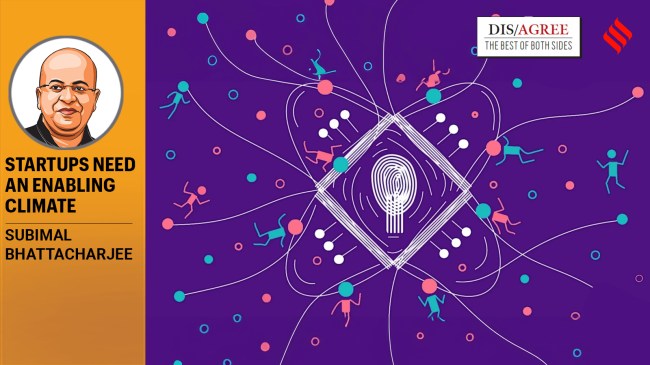Opinion Piyush Goyal is right. India needs an ecosystem that better enables deep-tech innovation
High-tech startups require massive government investment, education reform, and a cultural embrace of risk and longer hand-holding
 India’s global leadership aspirations in the tech arena hinged on low-end fruits. But today, technology and innovation are the biggest manifestations of power dominance. (Illustration: C R Sasikumar)
India’s global leadership aspirations in the tech arena hinged on low-end fruits. But today, technology and innovation are the biggest manifestations of power dominance. (Illustration: C R Sasikumar) On April 3, Commerce and Industry Minister Piyush Goyal issued a provocative critique of the Indian startup ecosystem at the second edition of the Startup Mahakumbh. His remarks sparked a debate, as he questioned the direction of Indian startups and lamented their focus on consumer-driven ventures like food-delivery apps, quick commerce, and boutique brands such as “fancy ice creams and cookies”. Goyal contrasted this with China’s startup landscape, where companies are advancing in high-tech fields like electric vehicles (EVs), semiconductors, artificial intelligence, and robotics.
The minister’s comments spotlight a sobering reality: India is struggling to foster groundbreaking innovation domestically, even as Indian talent thrives in high-tech sectors abroad. To become a global leader in a world racing ahead in technology, India must address systemic barriers and shift its focus beyond incremental, consumption-driven solutions. As the government focus on Viksit Bharat in 2047 gains steam, innovation will be a key driver and Prime Minister Narendra Modi has reiterated this on many occasions.
Goyal’s critique — that innovation in India is stagnating — holds weight when viewed against global benchmarks. The world is advancing at a breakneck pace in transformative technologies. AI models like those from OpenAI and DeepSeek are redefining industries, quantum computing is inching toward practical applications and renewable energy innovations are reshaping global economies.
The 2024 Global Innovation Index ranks China at 11th, while India is ranked 39th. This reflects a stark disparity in innovation ecosystems. India’s startup boom, while impressive in scale — over 100 unicorns and the third-largest startup hub globally — has largely been fuelled by consumer-facing businesses rather than deep-tech breakthroughs. Goyal’s reference comparing Indian startups with Chinese ones may seem simplistic, but it underscores a critical gap.
Why is innovation faltering in India? The reasons are multifaceted, rooted in structural, cultural, and economic challenges. First, the ecosystem lacks the robust support needed for high-risk, long-gestation deep-tech ventures. In China, the “Made in China 2025” initiative poured billions into strategic sectors, offering tax breaks and R&D incentives. India’s efforts, such as the Rs 10,000 crore IndiaAI Mission and a Fund of Funds for deep tech, pale in comparison, with total tech investment from 2014-2024 estimated at $160 billion, against China’s $845 billion. This funding gap stifles startups aiming to tackle complex problems.
Second, India’s education and research infrastructure and ecosystem lag behind. The country produces lakhs of engineers annually, yet its universities rarely rank among global leaders in original research. Many remain unemployable. Deep tech requires a passionate and skilled workforce and cutting-edge labs. India cannot compete with the US and China in this respect. As a result, Indian talent often migrates to Silicon Valley. Much beyond Sundar Pichai leading Google and Satya Nadella leading Microsoft, many Indians are driving innovation at firms like Tesla and NVIDIA and startups there.
This success rarely translates back home, where red tape and a risk-averse investment culture hinder progress. Spending on R&D by most companies has remained low despite policy announcements like Make in India.
Third, India’s venture capital (VC) landscape prioritises quick returns over patient capital. In the US, VCs back both decades-long outfits like SpaceX and quantum startups; in India, the focus remains on low-risk, high-reward consumer apps. This myopia, coupled with regulatory hurdles like the now-scrapped angel tax, stifles deep-tech growth.
Despite these challenges, India has seen pockets of quality startup success. Space startup Digantara has embarked on a very impactful journey. Likewise, Skyroot Aerospace and Agnikul Cosmos are making strides in space. Payment solution providers Paytm and PhonePe have ushered in the country’s digital payment revolution. Cybersecurity startups, too, have come up well, but most of them are acquired too fast to create an inspiring story of their own — this is another challenge.
As per Nasscom, India’s 4,000 deep-tech startups attracted $1.6 billion in 2024, a 78 per cent increase year-on-year. This is heartening. But it’s important to address the many gaps and move forward in areas that offer opportunities. With AI as a fulcrum for the significant incremental jump to look at areas in medical sciences, smart manufacturing, cyber security, defence technology, climate avenues or even computing, a nationwide effort has to be fostered to advance innovation out of the crutches of bureaucracy. The Indian IT industry grew decades ago. But it has not jumped steps to dominate global innovation.
So far, India’s global leadership aspirations in the tech arena hinged on low-end fruit. However, today, technology and innovation are the biggest manifestations of global power dominance. A nation with available tech talents cannot falter because of the gaps in its ecosystem. The prime minister has been a great motivator for innovation. It is upon industry and the venture capital community to be able to assess these talents and ideas and guide them towards success with proper hand-holding. Let more patents be filed for innovations to motivate minds towards ideation and tinkering.
Clearly, Goyal’s criticism should be a wake-up call. India must move beyond “dukandari” (shopkeeping) to foundational innovation. This requires a tectonic shift — massive government investment, education reform, and a cultural embrace of risk and longer hand-holding.
The writer, a defence and cyber security analyst, is former country head of General Dynamics




